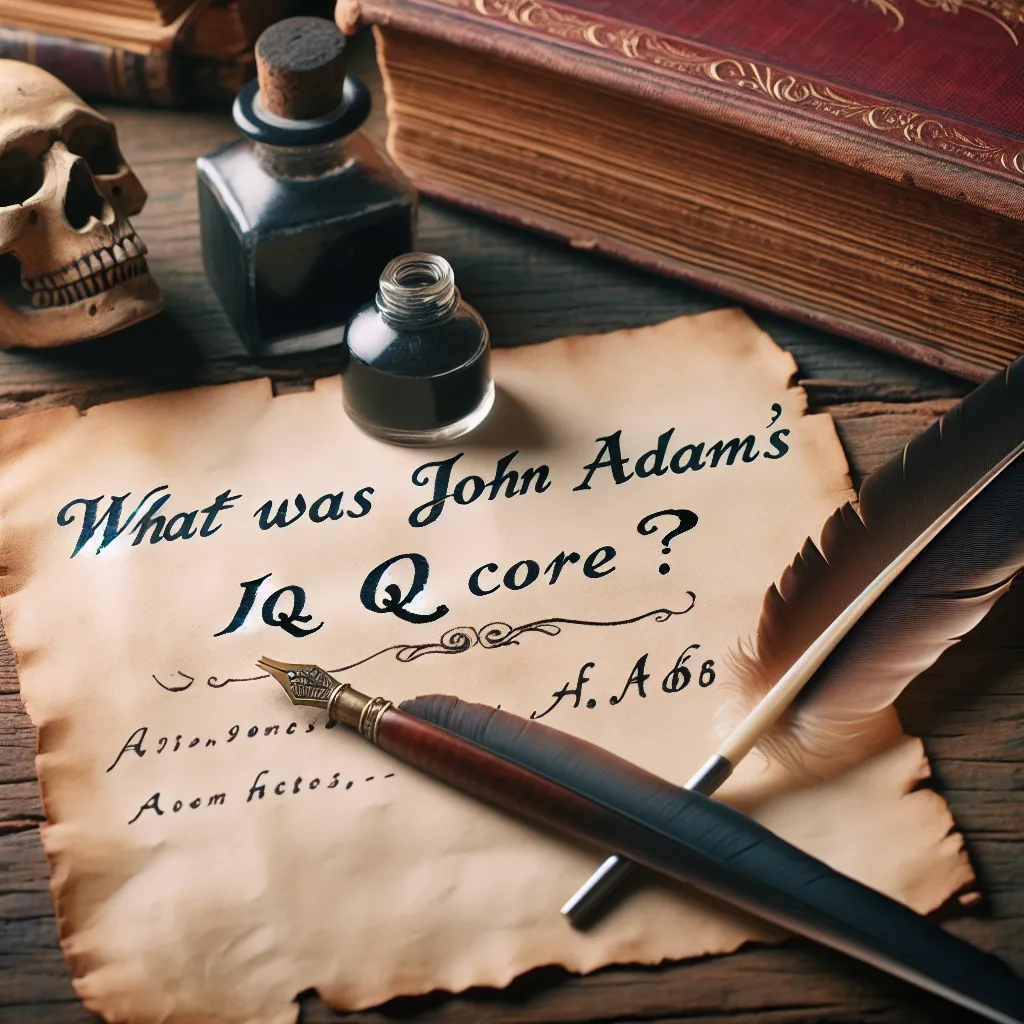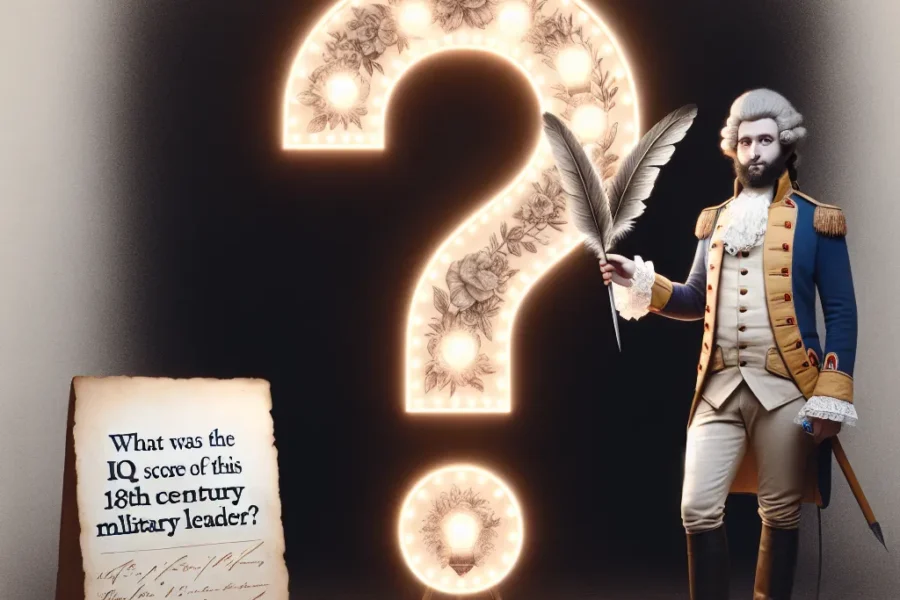Determining the IQ score of historical figures can be a fascinating exercise, bordering on the speculative. Such is the case with John Adams, the second President of the United States and a key figure in the founding of the nation. Adams, a prolific writer, astute diplomat, and profound thinker, has often been the subject of intense scrutiny. Scholars and historians alike marvel at his contributions to early American political thought. But what would his IQ score be if he were evaluated by modern standards? This question goes beyond mere trivia—it touches on the intersections of intelligence, historical context, and accomplishments.
If you are looking for legitimate IQ Tests which pass the entry bar for Mensa, see our IQ Tests.
### Who Was John Adams?
John Adams was born on October 30, 1735, in Braintree, Massachusetts. He played a pivotal role in American history, not only as a Founding Father but also as a lawyer, diplomat, and the second President of the United States serving from 1797 to 1801. Adams’s immense contributions to the American Revolution and the formation of the United States government have left an indelible mark on the country’s trajectory.
Growing up in Colonial America, Adams was subjected to the rigors of a classical education. He attended Harvard College, which was then a seminary focusing heavily on liberal arts and classical studies. Adams excelled in his studies, showcasing a formidable intellect early on. Nevertheless, measuring intelligence—especially in retrospective figures—is a complex endeavor.
### The Elusiveness of Measuring Historical IQs
When discussing IQ scores of historical figures like John Adams, it is crucial to understand that these assessments are speculative at best. Modern IQ tests did not exist during Adams’s lifetime. Developed in the early 20th century by psychologists like Alfred Binet and Lewis Terman, IQ tests aim to measure a range of cognitive abilities. Applying these modern-day constructs backward to historical figures is fraught with methodological issues.
That said, historians and psychologists often employ various indirect methods to estimate the intellectual capacities of historical personalities. They might consider the individual’s writings, correspondence, and achievements, interpreted through the lens of modern psychological understanding. In Adams’s case, his extensive written work, diplomatic achievements, and role in forming U.S. laws and constitutions would all be factors taken into account.
### What Might Adams’s IQ Have Been?
Although there is no definitive answer, some educated guesses can be made based on Adams’s accomplishments and intellectual output. John Adams was a voracious reader, enlightened thinker, and eloquent orator. His letters, diary entries, and political essays demonstrate a sharp, analytical mind capable of deep thought and complex reasoning. Many historians suggest that Adams could have possessed an IQ in the range of 130-160, categorizing him as “gifted” or even “genius” on modern IQ scales.
For instance, Adams’s role in drafting the Massachusetts Constitution of 1780 showcased his profound understanding of political philosophy and statecraft. This constitution would later serve as a model for the U.S. Constitution. Additionally, his diplomatic acumen was evident during his time in Europe, where he negotiated critical treaties and alliances pivotal for the fledgling nation.
### Contextual Factors and Comparisons
Considering Adams’s IQ potential also requires examining his intellectual contemporaries. Figures like Thomas Jefferson, Benjamin Franklin, and James Madison were peers and collaborators of Adams. Many historical estimates suggest that these Founding Fathers had similarly high levels of intelligence.
Jefferson’s comprehensive works on architecture, science, and politics, and Franklin’s multifarious contributions to science, literature, and diplomacy, set a high intellectual standard for the period. Matching Adams against such intellectual giants further underscores his apparent brilliance.
Adams’s education also played a crucial role in shaping his intellect. Harvard College in the mid-18th century was an institution that demanded rigorous intellectual discipline. The curriculum covered subjects such as Latin, Greek, logic, ethics, and mathematics, endowing students with a robust foundation in classical studies. This classical education molded Adams’s thinking, providing him with tools to approach complex problems systematically.
### The Modern-Day Relevance of Adams’s Intelligence
While assigning a modern IQ score to John Adams is primarily an academic exercise, it does have contemporary relevance. Understanding the intellectual capacities of historical figures offers insight into how they navigated and shaped their world. This understanding can also inspire current and future generations to approach politics, diplomacy, and governance with a similar blend of intellect, integrity, and commitment.
In today’s highly specialized world, the range of skills and knowledge expected of leaders has evolved. Nevertheless, the foundational intellectual rigor and versatility demonstrated by Adams and his contemporaries remain instructive. In an age where globalization and technological advancements present new challenges, the kind of analytical depth Adams possessed is arguably more crucial than ever.
### Adams’s Written Legacy
John Adams’s written legacy further corroborates the estimates of his high intelligence. His extensive correspondences, particularly with his wife Abigail Adams, provide a window into his thoughts, motivations, and the philosophical underpinnings of his political actions. These letters are replete with references to classical literature, contemporary works, and philosophical debates, revealing a man in relentless pursuit of knowledge.
Adams also authored several important pamphlets and essays advocating for American independence. His works like “Thoughts on Government” were instrumental in framing the philosophical basis for American republicanism. These writings reflect not just an astute political mind but also an ability to communicate complex ideas lucidly and persuasively.
### The Complexity of Historical Intelligence
Delving into Adams’s potential IQ highlights the complex nature of intelligence itself. Intelligence encompasses various domains, from linguistic and logical-mathematical to spatial and interpersonal abilities. Adams’s documented talents span these domains, showcasing a polymath’s range.
For example, Adams’s legal expertise demanded high logical-mathematical acumen, while his diplomatic successes required interpersonal and linguistic prowess. His ability to draft foundational political documents demonstrated spatial-visual intelligence in structuring complex concepts cohesively. Thus, assessing Adams’s intelligence means appreciating this multifaceted nature.
### Conclusion
While we will never know John Adams’s exact IQ score, it is clear that he possessed an extraordinary intellect that contributed significantly to the founding and shaping of the United States. Adams’s education, written legacy, and accomplishments provide ample evidence of his capabilities, inviting modern readers and historians alike to honor his intellectual contributions. Through critical thought, relentless inquiry, and eloquent expression, John Adams forged paths that have endured for centuries, securing his legacy as one of America’s great minds.
Understanding the brilliance of figures like John Adams isn’t just about assigning a number; it’s about recognizing the impact of rigorous intellectual endeavor on society. By examining their lives and contributions, we glean lessons that are timeless, applicable even in our modern, fast-paced world. In this light, John Adams’s presumed high IQ serves as a testament to the enduring power of intellect and its profound influence on history.



Leave a Comment